By GARRY RAYNO, InDepthNH.org
CONCORD — The House wants to prohibit sanctuary cities or towns in the state to shelter undocumented immigrants, but Democrats argued now is not the time with the Trump administration deporting immigrants without due process or any evidence they committed a crime.
Rep. Chris Muns, D-Hampton, told colleagues he could no longer support House Bill 511 with the nation’s long-standing principles of “innocent until proven guilty, due process and free speech” all being violated as immigrants are being rounded up and deported.
He told of his father as a teenager grabbed off a street in the Netherlands by German soldiers and taken to a work camp in Germany during World War II.
His parents decided to immigrate to the United States because they believed they would never be treated that way here, Muns said.
“Nearly all of us are immigrants,” Muns said. “The only question is when and how our ancestors arrived.”
All immigrants have that yearning to be free and quest for the American dream, he said, and that is what should still drive the country’s immigration policies today.
Instead people are arrested and held in county corrections facilities without being charged with a crime because ICE or another federal agency asked them to do that, Muns said.
If a person is arrested on a Thursday, the person can be in prison for five days without being charged with a crime, he noted.
Students at Columbia and Tufts universities were arrested by masked ICE agents and transported to Louisiana with no charges and no due process.
“I do not want New Hampshire to be Louisiana,” Muns said.
The prime sponsor of the bill, Rep. Joe Sweeney, R-Salem, said if an immigrant is in the country illegally or in New Hampshire illegally, “I don’t want you (here).”
He said New Hampshire is not immune to what happened in other parts of the country with crime and gangs and drug dealing.
The last four years have been an unmitigated disaster, he said, and those people that entered illegally need to be out of the country and not have sanctuary.
“We need to say ‘no.’ It is time to be the adults in the room and recognize a nation is nothing without borders,” Sweeney said. “We need to take the handcuffs off and cooperate with . . . ICE and protect New Hampshire and keep New Hampshire safe.”
But Rep. David Meuse, D-Portsmouth, noted 75 percent of the people sent to El Salvador had no traces of criminal records, noting that due process would have revealed that before they were sent to a prison in a country run by a dictator.
He said 300 students, including one at Dartmouth, had their visas revoked, not for committing a crime, but for expressing an opinion folks in the Trump administration don’t agree with.
“In America, you do not sign away your right to free speech when you enter this country,” Meuse said, “you do not sign away your right to due process because you have an accent.”
The bill was approved on a 211-161 vote and goes to the Senate which has passed a similar bill.
The House also approved House Bill 71, which prohibits the use of public schools and institutions of higher learning as shelters for undocumented immigrants.
Capital Budget
With little discussion, the House approved the $132.5 million capital budget for the next biennium.
The budget is about $10 million less than Gov. Kelly Ayotte proposed.
The House Public Works and Highways added $6 million to what the governor proposed, $20 million, to replace the Cannon Mountain Aerial Tramway, and removed $12 million for the renovation of Morse Hall at the University of New Hampshire, but retained $8 million the governor included for renovations at the Keene and Plymouth campuses.
The committee added $21 million for National Guard facilities in Plymouth and Pembroke, of which $1 million is general fund money.
Right-to-Know
The House approved House Bill 66 which would expand who could make a right-to-know request to anyone including someone who lives out of state by changing “citizen” to “person.”
If the request comes from someone without affiliation to New Hampshire, such as a New Hampshire taxpayer or owns property or does business in the state, then the person has to make the request in person and pick up the material in person.
New Hampshire connected individuals and the media may make right-to-know requests remotely and the material would be delivered electronically if that format is available.
The bill also allows available records to include preliminary drafts of reports and other documents that are circulated to a quorum of the body.
Concerns were expressed that some local offices could be overwhelmed with the expansion to those outside the state.
The bill passed on a 207-164 vote and now goes to the Senate for action.
Utilities
The House approved House Bill 696 which would exempt utility generators from paying the statewide utility property tax, and instead would have them pay the Statewide Education Property Tax and the Communications Tax.
The change will cost the state about $12 million annually in lost revenue.
The bill goes to the Senate for action.
Other Bills
The House passed and sent to the Senate:
House Bill 302, which allows the treasurer to invest in precious metals and digital assets;
House Bill 282, which increases the maximum benefits for first responders critically injured in the line of duty from $100,000 to $125,000, and the yearly maximum payments to $1 million from $500,000;
And House Bill 612, which enables the division of motor vehicles to create a temporary traditional driver’s license for youth operators about to turn 21 years old.
Garry Rayno may be reached at garry.rayno@yahoo.com.





